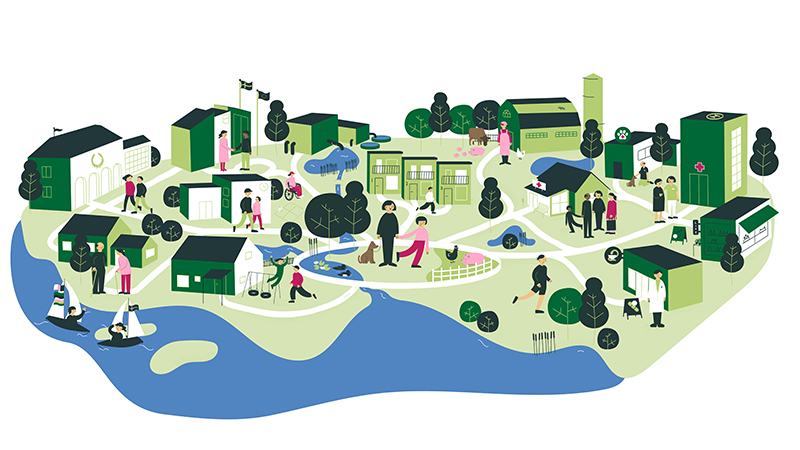Overview of Sweden’s One Health response to Antibiotic Resistance
Sweden has a relatively low use of antibiotics per capita and a comparatively favourable situation with regards to antibiotic resistance. This situation is influenced by factors such as a longstanding adherence to evidence-based guidelines, strong local commitment, and strategic efforts at both regional and national levels, in human as well as in animal health.
Everyone has a role to play in limiting antibiotic resistance development and spread of antibiotic resistant bacteria.
There is broad national consensus among stakeholders in Sweden from all relevant sectors on the overarching goal of preserving the ability to treat bacterial infections in humans and animals effectively. This is reflected in the common priorities and the strategy of the Swedish government and governmental agencies. The strategy, which is based on a One Health approach, is implemented through a national action plan by the different sectors.
Swedish Strategy to Combat Antibiotic Resistance 2024-2025 (government.se)
More detailed information on the response in Sweden to antibiotic resistance in the
The Intersectoral Coordinating Mechanism (ICM)
The Swedish government has appointed to the Public Health Agency of Sweden (PHAS) and the Swedish Board of Agriculture to chair an intersectoral coordinating mechanism that brings together representatives from national authorities and organisations.
This group engages 25 governmental agencies and organisations working in human health, animal health, food, environment, research, trade and civil contingency planning.
About the ICM (skyddantibiotikan.se)
Government agencies and organisations working together
Collaborations beyond the ICM - between national authorities and organisations such as NGO’s, trade associations, private actors and professional societies, as well as with local and regional entities - are essential for the successful implementation of the action plan and achieving its objectives.
These actors have unique opportunities to address the complex issue of antibiotic resistance in direct or indirect ways by leading and supporting actions that correspond to their interests and priorities. In Sweden, a wide range of individuals and organisations are invited to join a yearly Antibiotic Forum to discuss and exchange ideas.
Save Antibiotics (Skydda Antibiotikan) is a national campaign by the ICM that provides the public with easy-to-understand messages about antibiotics and the role everyone can play to prevent infection and safeguard antibiotics.
Save Antibiotics (skyddaantibiotikan.se)
Antibiotic Smart Sweden is an initiative by national, regional and local actors within public health, research and innovation. It invites citizens and a wide range of public and private stakeholders to take part in the work against antibiotic resistance within their own fields.
Communication and Behaviour Change
At the local and regional level, bodies such as county administrations, municipalities and environmental and health protection boards play important roles in specific areas like veterinary medicine, agriculture, food production and safety, environmental protection and health care. These entities provide expertise, oversight and support to ensure that activities related to these sectors are carried out effectively and in accordance with relevant policies, regulations and standards.
Research Collaborations
Antibiotic resistance is a priority research topic in Sweden.
Research in Sweden about antibiotic resistance
International Collaboration
Sweden is actively involved in international efforts regarding antibiotic resistance
Key components in the Swedish work against antibiotic resistance:
- Continuous work, with political and legislative support
- Consensus and cooperation locally, regionally and nationally, within and between sectors
- Disease prevention – healthy people and animals do not need antibiotics
- Transparent and reliable data for action and monitoring, including benchmarking of data on antibiotic consumption and feedback
- Active involvement in international efforts
Sweden is governed at three levels: national, regional and local, and is a member of the European Union. Laws, regulations, policies and administrative provisions at the respective levels promote and govern efforts across and within each sector.
The Swedish One Health approach to address Antimicrobial Resistance (AMR) is anchored in several key global and EU initiatives.
At the global level these include the Global Action Plan on Antimicrobial Resistance, endorsed by the WHO Member States, alongside complementary strategies such as the FAO Action Plan, the WOAH Strategy, the recommendations issued by the Interagency Coordination Group (IACG), and those of the joint work plan of the Quadripartite on AMR.
